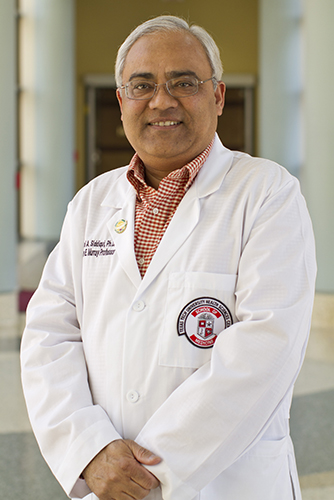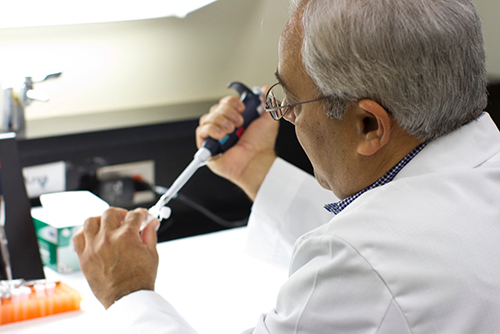TTUHSC Researcher Receives Grant from the Bill & Melinda Gates Foundation

Afzal A. Siddiqui, Ph.D.
A Texas Tech University Health Sciences Center (TTUHSC) researcher has received a grant for schistosomiasis vaccine research from the Bill & Melinda Gates Foundation. Afzal A. Siddiqui, Ph.D., a Grover E. Murray Distinguished Professor at the TTUHSC School of Medicine, received an additional $2,394,006 grant for the pre-clinical development of a vaccine for the human parasitic disease, schistosomiasis.
The Bill & Melinda Gates Foundation previously has awarded Siddiqui $3,122,659 for his research, “Proof of concept trial of Sm-p80/GLA-SE schistosomiasis vaccine.” With this award, the total amount of funding from the Bill & Melinda Gates Foundation on this project now stands at $5,516,665.
In 2016, the American Association for the Advancement of Science’s prestigious journal, Science, ranked schistosomiasis vaccine as one of the top ten vaccines that need to be urgently developed. The disease, which currently affects more than 200 million people, is not found in the U.S., but is endemic in 78 developing countries. An additional 800 million people are at risk of contracting schistosomiasis.
“An effective schistosomiasis vaccine could potentially impact up to one billion people in 78 countries where the disease is widespread,” said TTUHSC President Tedd L. Mitchell, M.D. “Dr. Siddiqui’s approach is to develop a vaccine that resolves the pathology. This vaccine is intended to prevent infections as well as treat existing infection.”
According to the National Institutes of Health, a person gets a schistosoma infection through contact with contaminated water. The parasite swims freely in open bodies of water. Once contact is made with humans, the parasite burrows into the skin, matures into another stage, and then migrates to the lungs and liver, where it matures into the adult form. Siddiqui said detection of calcified schistosome eggs in Egyptian mummies from the 20th dynasty (1250-1000 BC) tells us that schistosomiasis is an ancient disease. He has studied schistosomiasis for more than 25 years working to develop this vaccine.
“Major pathology of schistosomiasis is due to immunological reactions to schistosome eggs trapped in tissues,” Siddiqui said. “Continuing infection causes enlargement of the liver and blood in urine. We see pictures of children from Africa with bulging bellies because of this disease."
Despite mass treatment with drugs, infection rates continue to rise. Durable and sustained reduction in the disease spectrum and transmission can only be obtained by long-term protection through vaccination.
Steven L. Berk, M.D., executive vice president, provost and dean of the School of Medicine, said Siddiqui is an individual of extraordinary value in parasite immunology and vaccine development.

Siddiqui in the lab.
“Focusing on prevention means not spending on treatment,” Berk said. “Treatment is expensive and endemic areas do not have the luxury of having it on hand. With a vaccine, endemic areas will experience less debilitating consequences of schistosomiasis and improved lives for families. It also will help reduce transmission when people from these rural communities migrate to urban areas.”
Siddiqui is co-principal investigator along with Darrick Carter, Ph.D., on a NIH/SBIR-R44 grant ($3,828,539) with PAI Life Sciences of Seattle, Washington for the production of his patented vaccine. TTUHSC will receive $982,452 in subcontract during the life of the grant.
Siddiqui, who also serves as the director of the TTUHSC Center of Tropical Medicine & Infectious Diseases and vice president for Institutional Collaborations, holds several prestigious awards and appointments to local and national positions of honor, including a Fulbright Research and Teaching Scholarship for Southeast Asia.
Related Stories
Celebrating Veterans: TTUHSC’s General Martin Clay’s Legacy of Service and Leadership
From his initial enlistment in the Army National Guard 36 years ago to his leadership in military and civilian health care management roles, Major General Martin Clay’s career has been shaped by adaptability, mission focus and service to others.
Texas Tech University Health Sciences Center School of Nursing Named Best Accelerated Bachelor of Science in Nursing Program in Texas
The TTUHSC School of Nursing Accelerated Bachelor of Science in Nursing (BSN) program has been ranked the No. 1 accelerated nursing program in Texas by RegisteredNursing.org.
TTUHSC Names New Regional Dean for the School of Nursing
Louise Rice, DNP, RN, has been named regional dean of the TTUHSC School of Nursing on the Amarillo campus.
Recent Stories
The John Wayne Cancer Foundation Surgical Oncology Fellowship Program at Texas Tech University Health Sciences Center Announced
TTUHSC is collaborating with the John Wayne Cancer Foundation and has established the Big Cure Endowment, which supports the university’s efforts to reduce cancer incidence and increase survivability of people in rural and underserved areas.
TTUHSC Receives $1 Million Gift from Amarillo National Bank to Expand and Enhance Pediatric Care in the Panhandle
TTUHSC School of Medicine leaders accepted a $1 million philanthropic gift from Amarillo National Bank on Tuesday (Feb. 10), marking a transformational investment in pediatric care for the Texas Panhandle.
Texas Tech University Health Sciences Center Permian Basin Announces Pediatric Residency Program Gift
TTUHSC Permian Basin, along with the Permian Strategic Partnership and the Scharbauer Foundation, Feb. 5 announced a gift that will fund a new pediatric residency.
